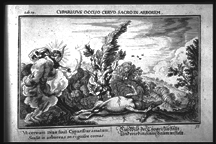

The Fable of Cyparissus
Amid the throng of this promiscuous wood,
With pointed top, the taper cypress stood;
A tree, which once a youth, and heav'nly fair,
Was of that deity the darling care,
Whose hand adapts, with equal skill, the strings
To bows with which he kills, and harps to which he sings.
For heretofore, a mighty stag was bred,
Which on the fertile fields of Caea fed;
In shape and size he all his kind excell'd,
And to Carthaean nymphs was sacred held.
His beamy head, with branches high display'd,
Afforded to itself an ample shade;
His horns were gilt, and his smooth neck was grac'd
With silver collars thick with gems enchas'd:
A silver boss upon his forehead hung,
And brazen pendants in his ear-rings rung.
Frequenting houses, he familiar grew,
And learnt by custom, Nature to subdue;
'Till by degrees, of fear, and wildness, broke,
Ev'n stranger hands his proffer'd neck might stroak.
Much was the beast by Caea's youth caress'd,
But thou, sweet Cyparissus, lov'dst him best:
By thee, to pastures fresh, he oft was led,
By thee oft water'd at the fountain's head:
His horns with garlands, now, by thee were ty'd,
And, now, thou on his back wou'dst wanton ride;
Now here, now there wou'dst bound along the plains,
Ruling his tender mouth with purple reins.
'Twas when the summer sun, at noon of day,
Thro' glowing Cancer shot his burning ray,
'Twas then, the fav'rite stag, in cool retreat,
Had sought a shelter from the scorching heat;
Along the grass his weary limbs he laid,
Inhaling freshness from the breezy shade:
When Cyparissus with his pointed dart,
Unknowing, pierc'd him to the panting heart.
But when the youth, surpriz'd, his error found,
And saw him dying of the cruel wound,
Himself he would have slain thro' desp'rate grief:
What said not Phoebus, that might yield relief!
To cease his mourning, he the boy desir'd,
Or mourn no more than such a loss requir'd.
But he, incessant griev'd: at length address'd
To the superior Pow'rs a last request;
Praying, in expiation of his crime,
Thenceforth to mourn to all succeeding time.
And now, of blood exhausted he appears,
Drain'd by a torrent of continual tears;
The fleshy colour in his body fades,
And a green tincture all his limbs invades;
From his fair head, where curling locks late hung,
A horrid bush with bristled branches sprung,
Which stiffning by degrees, its stem extends,
'Till to the starry skies the spire ascends.
Apollo sad look'd on, and sighing, cry'd,
Then, be for ever, what thy pray'r imply'd:
Bemoan'd by me, in others grief excite;
And still preside at ev'ry fun'ral rite.
Thus the sweet artist in a wondrous shade
Of verdant trees, which harmony had made,
Encircled sate, with his own triumphs crown'd,
Of listning birds, and savages around.
Again the trembling strings he dext'rous tries,
Again from discord makes soft musick rise.
Then tunes his voice: O Muse, from whom I sprung,
Jove be my theme, and thou inspire my song.
To Jove my grateful voice I oft have rais'd,
Oft his almighty pow'r with pleasure prais'd.
I sung the giants in a solemn strain,
Blasted, and thunder-struck on Phlegra's plain.
Now be my lyre in softer accents mov'd,
To sing of blooming boys by Gods belov'd;
And to relate what virgins, void of shame,
Have suffer'd vengeance for a lawless flame.